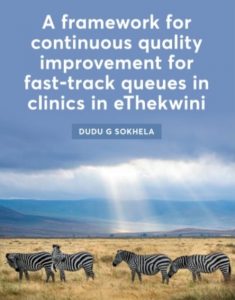The dynamic Dr Dudu Glory Sokhela from the Durban University of Technology (DUT), has excitedly shared on her new book titled: A framework for continuous quality improvement for fast-track queues in clinics in eThekwini.
She explained that this exhilarating book is a reworked doctoral thesis based on research that was conducted at primary health care (PHC) focusing on fast track queues and it provides scholars with an exploration of the intricate dynamics of primary health care facilities in South Africa. Dr Sokhela indicated that South Africa, is faced with a burden of communicable and non-communicable diseases, new strategies are required to address the ever-changing disease pattern and the rapidly growing populations.
“The book discusses the essential role of primary health care facilities as the first point of contact for communities with the health system, in mitigating the burdens confronting PHC facilities such as long waiting time and overcrowding which emanates from the escalating rates of the quadruple burden of disease including communicable and non-communicable diseases, to help to expand health care access to historically marginalised groups,” she said. In terms of the book’s contribution;
Dr Sokhela indicated that she had firstly used the clinical microsystems model and mixed-methods approach to identify patterns in fast-tracking of patients in order to identify bottlenecks and point out areas for improvement based on interviews and observations, which evaluated the care provided by PHC providers. “The second contribution is that; in this book, I make recommendations that can be used to improve patient experience in the health care system despite the challenges such as staff shortages and increased workload, that inhibit comprehensive assessment of patients”.
Thirdly, the book proposes a model to strengthen support for nurses and optimise health care delivery, while ensuring timely consultation without compromising quality. Fourthly, this is a resource for scholars and professionals who specialise in PHC and related fields, this book paves the way for transformative advancements in health care service delivery and patient outcomes,” she professed.
The idea of this first book, as mentioned by Dr Sokhela, is besides several articles that she had published. She commented that after conducting research, the main purpose is to disseminate findings and recommendations for implementation/application in the relevant field. “Thesis and dissertations are accessible online, but the book is more visible to other healthcare professionals outside of academia, particularly those who are the target audience for this book. The book is intended for use by PHC managers and health care providers alike, in order to improve workflow at PHC facilities, making it more relevant and useful to these professionals,” she added.
Speaking about the author, Dr Sokhela, she was born and raised in rural KwaNgcolosi on the periphery of Hillcrest near Inanda Dam.
“My parents who had limited education instilled in me the importance of education,” she explained. Dr Sokhela had attended the local secondary school at the then Hlahlindlela Secondary school. Due to her mother, MaDlamini’s insistence, she could not pursue a vocational career after completing form three (now grade 11). Instead, she had proceeded to matriculate at a Catholic boarding school; Sacred Heart High School in Verulam. “I am proud to be the first in my family to earn a professional nursing diploma qualification , and the first to achieve a Doctoral Degree,” said the immensely grateful Dr Sokhela.
Her journey at DUT bore academic fruit where she had started at DUT as a clinical nurse specialist in 2009 and after obtaining a Master’s degree, she became a junior lecturer, teaching theory and clinical practice in the B Tech Nursing: Primary Health Care programme. Five years later she had obtained a Doctoral degree and soon became a senior lecturer.
“My tasks included the supervision of postgraduate students and I have graduated a number of Master’s and Doctoral candidates and published several articles with students and independently. Currently, Dr Sokhela is teaching Nursing research to Post Graduate Diploma students (Primary Care Nursing, Occupational Health Nursing and Health Systems Management) and is a postgraduate coordinator.
Dr Sokhela confessed that her first love for reading began when she was a young child as she would sit and read English newspapers that her mother brought from work. “Even though I was young and studying in IsiZulu in lower grades I loved reading and was sometimes accused of being lazy and hiding behind books to avoid weekend house chores such as fetching water from the river, collecting firewood, ploughing in the field or polishing the house floors using cow dung,” she chuckled.Her parents were not educated, however they strongly believed that reading and writing should only happen on weekdays. “I was captivated by the words that were used, even though I did not know their meaning, and thrilled that I was able to get the gist of the story. Reading opened up my mind and I was brighter than my school mates,” she replied. When she got older, in high school, she had an exercise book where she had created her own stories writing English poetry and that is how she began expressing herself as just like her father she was not a big talker. 
“It was when I began studying towards my Master’s degree that my writing skills were actually put to the test with some improvement at a Doctoral level. To date, Dr Sokhela has written three book chapters, which are currently awaiting publication. “In addition, I am interested in assisting up and coming academics who want to pursue writing of their thesis and dissertations into a book,” she confessed.
She professed that writing a book while working full time required a lot of dedication, sacrifice and hard work, but it was possible. Dr Sokhela further thanked those close to her heart for all that they had done during her time of writing.
“I would like to thank the following people: the promoters of my research, Profs MN Sibiya and T Gwele, the Executive Dean of the Faculty of Health Sciences Prof GG Mchunu for her support of staff development and all those who participated in my doctoral thesis, my two daughters Nosipho and Thula Mngoma, who had gone through university and understood the pressure of deadlines and would calm me down,” she said.
Dr Sokhela also indicated that this book project was facilitated by the Durban University of Technology (DUT) Research Office and Doctoral Leadership Academy (RADLA), headed by Professor Cheryl A Potgieter.
“I would also like to thank the commissioning editor, Professor Andries G van Aarde whose consultations brought the book to life, the media desk and the whole editorial team at AOSIS.
“It was so empowering to work with all of these professionals,” she explained.
Dr Sokhela’s book was published online on 31st May 2024 through ITUTA ASOSIS and is accessible on: https://doi.org/10.4102/aosis.2024.BK452
Pictured: Dr Dudu Sokhela.

